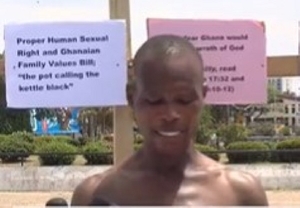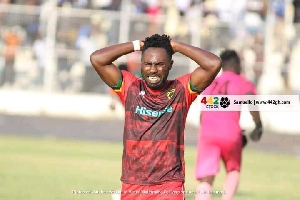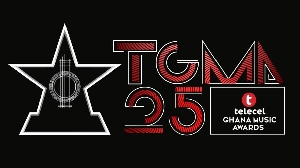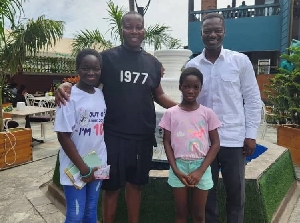Opinions of Friday, 8 October 2010
Columnist: Okoampa-Ahoofe, Kwame
K. B. Asante and the Politics of Hypocritical Sophistry
By Kwame Okoampa-Ahoofe, Jr., Ph.D.
I used to confuse him with the distinguished and erudite Ghanaian lawyer, scholar and invested traditional ruler whom I greatly admired growing up at Kwabenya-Accra. And here, of course, I am referring to Prof. S. K. B. Asante, a man whom I deeply respected long before I came to fully appreciate his great intellectual acumen and remarkable stature among the giants of African political scientists, philosophers and thinkers.
The foregoing, of course, is not in anyway intended to imply that Mr. K. B. Asante does not have a respectable place among the ranks of Ghanaian politicians and diplomats. It is simply that the man could do himself and the rest of us, his countrymen and women, far edifyingly better by standing frontally up to the truth and not sophistically pretend that, somehow, it is rather the ideological opponents of Mr. Kwame Nkrumah, and not vice-versa, who are most guilty of not constructively and progressively recognizing the stark existential fact that, indeed, nation-building is a collaborative effort, and not a cultic personality paean to the Machiavellian hijackers of national histories and patrimonies.
In sum, in his article pontifically titled “A Country Without Heroes Is Not Worth Dying For” (See MyJoyOnline.com 10/4/10), Mr. K. B. Asante could have won a bit of the respect of those of us ardent Danquah-Busia-Dombo scions who firmly believe in the peaceful coexistence of divergent ideologies in the civilized democratic market of modern Ghana. Alas, what we get in the afore-referenced article is a deftly orchestrated dishonest attempt at apotheosizing the African Show Boy, while simultaneously pretending to be objectively acknowledging the yeomanly contributions of pre-Nkrumah Ghanaian leaders. And I am deeply sorry to say, but in willfully electing to play fast and loose and gapingly “agnostic” with the incontrovertible facts of contemporary Ghanaian history, the author ends up achieving, counterproductively, precisely what he so passionately pretends to decry.
Thus, for instance, while Mr. Asante rightly notes that there were, indeed, great nation-builders and freedom fighters before the man in whose government he served as a diplomat, nonetheless, the writer quizzically fails to name a single of such pre-Nkrumah Ghanaian leaders, almost as if to curiously imply that the mere acknowledgment of such pioneering statesmen or women would, perforce, seriously detract from the historical significance and stature of the African Show Boy.
But that this flaw glaringly appears to be a tacit mantra among the ranks of leading Nkrumacrats is all the more to be pitied. In the meantime, one is left wondering whether, indeed, Mr. K. B. Asante really means it when he also quite prosaically observes that more distinguished and notable Ghanaian statesmen and women, as well as model citizens, are apt to healthily emerge in the offing.
On the question of whether Ghanaian scholars and intellectuals egregiously err in invariably referencing the works of their European predecessors and counterparts, perhaps, the most fitting riposte is for the rather cynical critic to examine the bibliographical and epistemic sources of the writings of Mr. Kwame Nkrumah himself. And were this to be honestly undertaken, the critic would, no doubt, come to the predictable conclusion that the shape and form of modern scholarship, as we have come to know and recognize it, is decidedly Western/European in cultural orientation and as such, and perforce, dictates that much of postcolonial African scholarship would be heavily indebted to the same. And on the latter score, if one may aptly query, even if just in passing, whether Mr. Asante recognizes the ironic fact that his own hero’s putatively intellectual masterpiece, Consciencism, a pseudo-philosophical treatise, is heavily and unabashedly Marxist in both content and orientation. And does the preceding revelation in any way, shape or form invalidate the “scholarship” contained therein?
Now, let me fast-forward in plainer terms than the preceding by demanding of the critic whether he finds the meticulous and systematically sound and largely objective scholarship of Messrs. Basil Davidson and Dennis Austin, for ready examples, and that of W. E. F. Ward, to be significantly lacking in epistemic thrust than the most talented of their indigenous continental African counterparts, merely because being of European nationality, and/or descent, is an incurable cognitive blight that automatically renders scholarship on the proverbial primeval continent hermetically impossible?
In other words, this callow tendency by ardent Nkrumacrats to impugn the scholarship of any European-born specialist of African history, politics and culture is a shallow and objectively untenable thesis that must not be tolerated for the vacuous sake of epistemic indigenization (or Africanization), which, by the way, invariably becomes a lurid pretext for apotheosizing the memory, as well as “hagiographizing” the personalities, of reprobate African leaders and deniers of our inalienable human rights. Mr. Asante also attempts, rather pathetically, to sanitize Nkrumah’s flagrant policy of imposing parliamentary candidates on constituencies, often candidates who neither lived in the concerned constituencies nor even remarkably appreciated the local political culture, in a purportedly salutary attempt at evenly spreading the national wealth.
Oftentimes, such candidates came from Accra or one of the regional capitals and thus were relatively endowed with such perks of modern “Western/European” culture as literacy and ready access to political influence and basic amenities. Anyway, sophistically and ironically quoting British political theorist Sir Edmund Burke as follows: “Parliament is not a congress of ambassadors from different and hostile interests which interest each must maintain but parliament is a deliberative assembly of one nation, with one interest, that of the whole, is where not local purposes, not local prejudices ought to guide, but the general good, resulting from the general reason of the whole.” And: “You choose a member indeed, but when you have chosen him, he is not a ‘member of Bristol, but he is a member of parliament,” Mr. K. B. Asante criminally attempts to justify Nkrumah’s invidiously inorganic approach to parliamentary representation.
You see, what is unpardonably laughable here is that in the rather garishly colorful imagination of Mr. K. B. Asante, it is grossly remiss for any Afrocentric Ghanaian scholar to draw on the well-measured and respectable corpus of his European counterparts and predecessors but, somehow, the same rule does not apply when it comes to picking parliamentary candidates. Then even eighteenth-century European political philosophy comes in handy, especially when the one doing such capricious picking of parliamentary candidates is the African Show Boy! What is even more fascinating about Mr. Asante’s argument is the implication that since the Danquah-Busia-Dombo camp tended to field relatively better educated candidates for parliament and invariably appeared to have the upper hand in parliamentary debates, it, perforce, stood to reason for President Nkrumah to ride roughshod over organic democratic principles by imposing “foreign” candidates on rural constituencies. Talk of equality of citizenship under CPP governance!
Anyway, the very title of Mr. Asante’s article, “A Country Without Heroes Is Not Worth Dying For,” is a pun that is shamelessly taken from Dr. J. B. Danquah. However being an ardent, albeit an urbane and debonair, Nkrumacrat, I did not expect that the critic would be honest enough to reference the putative Doyen of Gold Coast and Ghanaian politics. Well, in his quite remarkable Autobiography of an African Patriot, Mr. Joseph (Joe) Appiah poignantly recalls being holed up together at the Nsawam Medium-Security Prison with the avuncular “JB” and in one of the latter’s most despondent moments, wistfully sighing and rhetorically posing: “Is Ghana Worth Fighting For?” Indeed, it is quite admirable that Mr. Asante appears to poignantly answer Danquah’s poser or riddle. His apparent reluctance or crippling inability to name other equally heroic Ghanaian statesmen (and women) in his paean to Mr. Kwame Nkrumah, very much underscores the considerably long way that we, as Ghanaians, have to travel in order to reach the proverbial Promised Land.
*Kwame Okoampa-Ahoofe, Jr., Ph.D., is Associate Professor of English, Journalism and Creative Writing at Nassau Community College of the State University of New York, Garden City. He is a Governing Board Member of the Accra-based Danquah Institute (DI) and the author of 21 books, including “Selected Political Writings” (Atumpan Publications/Lulu.com, 2008). E-mail: okoampaahoofe@optimum.net.












